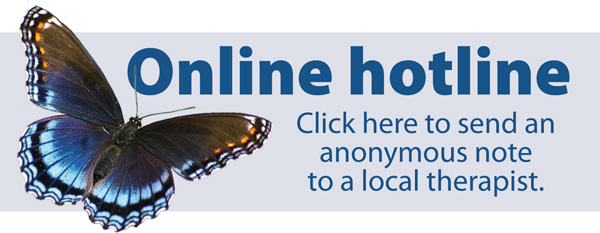 NOTE: The question below reached us through our “online hotline” button which lets anyone send a question to a local counselor at Ozark Guidance — in a completely anonymous way. The email comes in with no email address and no identifying information. We set it up this way so women would feel free to write about anything on their mind.
NOTE: The question below reached us through our “online hotline” button which lets anyone send a question to a local counselor at Ozark Guidance — in a completely anonymous way. The email comes in with no email address and no identifying information. We set it up this way so women would feel free to write about anything on their mind.
I have a mentally ill, but thus far undiagnosed, mother. It is becoming increasingly difficult for me to be around her because of her insistence on continuously talking about her paranoia and delusions/hallucinations. I already struggle with feelings of anxiety and depression, and while I want to be a part of my mother’s life, I am finding that my own problems are exacerbated during and after contact with her. What is the best approach to dealing with this issue?
Response by Libby Bier, MA, NCC, LPC, LADAC
Thank you so much for taking time to submit this question. You might be surprised to learn how many have similar struggles. You raise several important issues including diagnosis and treatment for your mother, as well as care for yourself and the impact her illness is having on your relationship.
Before I address these, I want to start off by saying that if any of your mother’s symptoms put her or anyone else in danger, she may need to go to the hospital. If the danger is immediate, call 911. (Once she’s in treatment, there may be some other options you can explore with the treatment team that can help with accessing care.)
Let’s start with you, though, and first look at the importance of self-care. You mentioned you already struggle with your own anxiety and depression. An important component to addressing your mother’s issues is making sure you’re in a good place yourself. Are you familiar with coping strategies for yourself such as relaxation, positive thinking, healthy support systems, and setting limits or boundaries? Are you taking care of yourself by taking care of the basics: relaxation, exercise, diet, sleep, and spending time with others who aren’t caught up in this challenging situation? If you are and it’s not working, have you looked into treatment for yourself?
When you’re doing all of this for yourself, then you’re better equipped to begin addressing the concerns you have for your mom. This will also improve your ability to be in a relationship with someone who may need some ongoing support to manage potential psychotic symptoms. I say “psychotic symptoms” rather than a specific mental health disorder because there are many reasons as to why someone may have paranoia, delusions and hallucinations.
This leads to diagnosis and treatment. A lot of information is needed to determine if someone is psychotic due to a mental disorder or if there’s some underlying medical issue. A good first step in getting your mother care is a medical evaluation by a primary care provider. It’s ideal if it can be someone with whom she already has a trusted relationship (to help with any reluctance or paranoia on her part). If no underlying medical issues are found, then being evaluated by a mental health care professional would be important.
It’s really important for whoever is working with your mom to have a complete picture of how her symptoms are affecting her functioning. This will help with diagnosis and the development of a plan of care.
Research tells us that many people are not even aware they have mental health symptoms. This can make it really frustrating when the person does not believe they need help and can put additional strain on the relationship. Sometimes it’s not helpful to challenge the delusions or hallucinations while you’re trying to first connect her with treatment. The insight that she is experiencing symptoms of an illness may not come until she has been in care for some time. Even as a professional, I have to sometimes remind myself to not take it personally when someone becomes agitated or mistrustful. This helps take the pressure and focus off of me or the individual and instead puts emphasis on them and recovery.
To summarize, here are your next steps:
1. Take care of yourself so you can be there for mom (the commonly used analogy is that if you are flying, the pre-flight instructions always include putting the oxygen mask on yourself before taking care of others around you).
2. Work with mom to connect with primary care and, if necessary, mental health care.
3. Try not to take mom’s behavior personally. It sure can feel personal, and some of the things people do when they’re sick can even seem like an attack. But remember, these are not things mom would be doing if she were feeling better.
One last thing to remember about this is it may not be possible to immediately “force” mom into getting help, (hence all the talk about taking care of yourself). There are some steps that can be taken if there is danger to self or others or if there’s some long-term impairment that prevents her from taking care of herself. However, delusions and hallucinations are not always, by themselves, enough to secure care for someone against their will.
I hope this has been helpful. If after your mom has seen a primary care provider, it’s determined that she needs a mental health care provider, the staff at Ozark Guidance would be happy to assist with an evaluation to determine what services are needed and to connect her with resources within our agency and in the community.
Therapists at Ozark Guidance would be happy to answer your questions and read what’s on your mind. Click the butterfly icon below to fill out an anonymous submission form with your question or concern. The form contains NO identifying information and is designed to give local women an online place to share concerns with a person qualified to offer feedback.
 Disclaimer: This RESPONSE does not provide medical advice It is intended for informational purposes only. It is not a substitute for professional medical advice, diagnosis or treatment. Never ignore professional medical advice in seeking treatment because of something you have read on nwaMotherlode or Ozark Guidance websites.
Disclaimer: This RESPONSE does not provide medical advice It is intended for informational purposes only. It is not a substitute for professional medical advice, diagnosis or treatment. Never ignore professional medical advice in seeking treatment because of something you have read on nwaMotherlode or Ozark Guidance websites.





